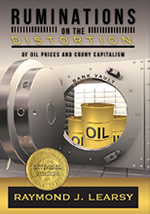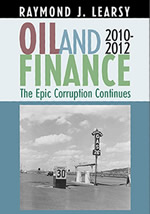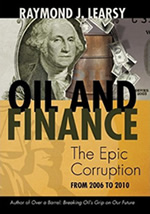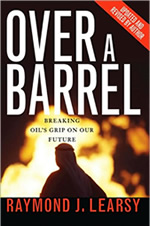REVIEWS
Kirkus Indie Review
RUMINATIONS ON THE DISTORTION OF OIL PRICES AND CRONY CAPITALISM
July 8, 2013
In this fiery collection of blog posts, veteran commodities trader Learsy (Oil and Finance, 2012, etc.) rails against the global oil-industry.
According to the oil industry, oil is a commodity that’s subject to the forces of supply and demand. But this is far from the complete truth, writes Learsy, a regular contributor to the Huffington Post who made his fortune as founder of a worldwide commodities trading firm. Oil prices, he asserts, are captive to the machinations of commodity speculators, investment banks, OPEC and petroleum heavyweights such as Russia. These entrenched interests can influence U.S. policy at the highest levels, he says, and distort prices for their own benefits.
“We are robbed of billions of dollars every day by oil interests, in their manipulation of the market pricing mechanisms, at massive cost and risk to the world’s economy,” he writes.
Penned with a hefty dose of what the author calls “rightful anger,” the book looks at a turbulent 18-month period from January 2012 to May 2013 that witnessed the 2012 U.S. presidential election, oil prices spiking more than 9 percent in a single day and revelations of JP Morgan Chase’s “London Whale” trading debacle. Learsy’s blog entries address a range of oil-related topics, and his central theme soon emerges: The oil market has been hijacked by profiteers who game the system. Learsy alleges cronyism and inept oversight by the U.S. Commodity Futures Trading Commission, the U.S. Department of Energy, Congress, the courts and multiple presidential administrations. His posts combine insider knowledge and trenchant wit, and he isn’t afraid to rebuke people when he feels they deserve it—including former Energy Secretary Steven Chu, Saudi Oil Minister Ali al-Naimi and JP Morgan Chase head Jamie Dimon. The book suffers, however, from a limitation that’s common to blog-based collections: Its brief chapters whiz past like a series of editorials instead of probing deeper like an investigative exposé. That said, the author’s stated goal is to educate everyday consumers, and as such, the book effectively elbows its way into the growing Main-Street-fights-back genre.
A rallying cry for readers who feel ripped off at the gas pumps.
Kirkus Media Review
Oil and Finance: The Epic Corruption Continues 2010-2012
An unholy alliance of Wall Street bankers, energy traders, OPEC pooh-bahs and complaisant government regulators are pillaging the American economy, according to these savvy, feisty polemics. Learsy, a commodities trader, updates his previous entry in this series with a new collection of his Huffington Post blogs. His pieces circle around two great swindles: First, the government bailout of select financial institutions, especially its rescue of insurance giant AIG; he alleges that Secretary of the Treasury Hank Paulson and Goldman Sachs CEO Lloyd Blankfein cooked up the bailout during secret phone calls so that Goldman’s and other banks’ holdings of AIG derivatives could be paid off with taxpayer money. Second, the run-up in oil prices was in a market the author believes to have been glutted by stored oil and manipulated refinery capacities. (Learsy thinks petroleum should be trading for around $30 per barrel, not $100.) Here Learsy targets many culprits: banks that speculate in oil using virtually free loans from the Fed and FDIC-insured deposits; Saudi officials who restrict oil output; President Obama, who could burst the price bubble by selling oil from the Strategic Petroleum Reserve; and newspapers that peddle peak oil alarmism, which Learsy smartly debunks. Other selections support a high-speed rail system, warn of looming global food shortages, and cheerlead for the Occupy Wall Street movement. Learsy’s writing has a blunt, plainspoken style—sample headline: “The Oil Market Plays Casino While the Obama Administration Acts as Croupier”—that sits well with his populist indictment of Wall Street and its patsies in Washington. He has an insider’s knowledge of the intricacies within the global financial web, which he explains with clarity and biting wit; yet he’s not afraid to take bold, iconoclastic positions. (Among his anti-market heresies are calls for nationalizing the oil industry and establishing an American grain cartel.) At times, though, Learsy’s prescriptions trip over themselves; economists and environmentalists will choke at his suggestion that we step up off-shore drilling to bring down oil prices—and then impose gasoline rationing to force Americans to conserve. But that’s just one questionable pitch among better cases to be made in this take-no-prisoners savaging of the global economy’s oily underbelly.
Punchy prose and canny muckraking make for an informative, entertaining challenge to economic orthodoxy.
ForeWord Clarion Review
Oil and Finance: The Epic Corruption Continues 2010-2012
Four Stars (out of Five)
One standard definition of “epic” is “surpassing the usual or ordinary, especially in scope or size.” It is unfortunate that Raymond Learsy is not exaggerating when he uses the term in the title of his new book, Oil and Finance: The Epic Corruption Continues 2010-2012. Here, Learsy’s regular Huffington Post columns are collected into a cohesive two-year narrative indicting the individuals and organizations he sees as the specific culprits in that grand-scale corruption.
With Oil and Finance: The Epic Corruption Continues 2010-2012, Learsy continues the careful analysis of these subjects that he began with his previous book, Oil and Finance: The Epic Corruption from 2006 to 2010. Learsy has made a few improvements with the new volume, most notably that these columns run chronologically, not by subject matter, which helps the reader better appreciate the circumstances surrounding the topics of discussion. The book’s timeliness means that hot-button issues like the Marcellus Shale deposits are fully addressed.
Due to the serial nature of the original publications, there is some repetition of facts and opinions, but, for the most part, these points are strong ones that deserve to be covered again.
Learsy is fearless with his criticisms, even concerning The New York Times and its coverage of the events recounted in the book. When reporter Andrew Ross Sorkin and billionaire investor Warren Buffett defend Goldman Sachs, Learsy not only calls out the august newspaper’s investigative deficiencies, but also points out Buffett’s inherent conflicts of interest in publicly defending a firm into which he is heavily invested.
Domestically, Goldman Sachs and other bank holding companies draw Learsy’s ire; on the international front, he targets OPEC. Learsy writes, “OPEC is willfully manipulating the oil market and Wall Street Banks—JPMorgan Chase, Morgan Stanley, and Goldman Sachs—are using their official designation as bank holding companies to access cheap money from the Federal Reserve . . . to play casino with the core commodities of our economy.”
Learsy does not strike a political agenda, targeting Democrats and Republicans alike for their failures, and offering the occasional word of praise for figures who stand up and cry foul at the entire situation.
What elevates Oil and Finance: The Epic Corruption Continues 2010-2012 beyond mere expert reporting is that Learsy also offers creative suggestions on how to break free of the stranglehold of OPEC’s financial domination. These include ideas such as organizing America’s oil resources into a form of governmental entrepreneurship on the model of the Tennessee Valley Authority, or using the country’s vast food resources as a bargaining chip to counter the increasing economic cost of playing OPEC’s game, on OPEC’s terms.
For most readers, the volume will most certainly shed a revealing light on the energy issue. As one of only a few voices willing and qualified to eloquently challenge the status quo, Raymond Learsy has once again proven his insight to be invaluable.
Peter Dabbene
Business Traveler (Reviewed: September 30, 2011)
I remember, as an idealistic and somewhat naive university student, marching down to Trafalgar Square in London with thousands of others demanding for troops to be withdrawn from Iraq.
That public anger only escalated as particulars about the war were revealed to indicate that the entire mission was somewhat of a deception and the occupation unnecessarily long.
However, Oil and Finance: The Epic Corruption sheds light on one of the many reasons the West took so long to leave: Saudi Arabia had insisted troops stay in Iraq, using their oil supplies as leverage. Learsy sprinkles his book with similarly shocking nuggets of information throughout.
Through a series of essays in The Huffington Post between 2006 and 2010 chronicling oil price fluctuations, he reveals the crooked ways of the oil industry and draws connections with a variety of issues, such as national security, economic stability, global politics and environmental concerns.
He highlights the fact that the oil industry doesn’t work according to free market principles and is instead artificially manipulated by its largest suppliers, leaving importers, industries and individuals vulnerable to sudden changes.
Not only does he look abroad at the role of the OPEC cartel, which pulls most of the strings in determining oil prices, he looks inwards too at slimy multinational oil companies, all the while consistently calling for greater oil self-reliance and adoption of green energy sources.
Looking back through collated real-time coverage provides much needed hindsight and clarification of the oil industry. However as most of the book is his own strong opinion it can become hard to view the issue impartially.
Alisha Haridasani
Blueink Reviews (Reviewed: July 2011)
Compiling blog posts into a book is a new path to publishing filled with obvious potential dangers: the very timeliness of blog postings can mean a short shelf life for relevant information; read as a body of work, the posts might seem disconnected, repetitive or both; and many bloggers care little about memorable or even coherent prose.
Fortunately for readers, Raymond J. Learsy recognizes these pitfalls and, so, avoids them. Yes, some of these posts from Learsy’s Huffington Post blog have been overtaken by national and world events in the oil industry, in legislatures, at the gas pump. Mostly, though, the division of the posts into categories and subcategories, then arranged chronologically, gives the book a coherence that leads to a welcome learning curve about how United States oil dependence is damaging society.
Learsy is not trained as an investigative journalist. Rather, he describes his career as centered in the commodity trading field, with his expertise in the shipping of oil and liquefied natural gas cargos. Yet Learsy demonstrates the characteristics of an investigative journalist as he exposes sacred cows and does his best—in the contexts of oil price gouging by producers and environmental degradation—to afflict the comfortable and comfort the afflicted.
The first section of the compilations focuses on “Enemies Foreign,” especially the oil-producing nations known as OPEC. Learsy then moves to “Enemies Domestic,” particularly multinational oil companies and politicians who do their bidding. “How We Can Fight Back” constitutes the final section, in which Learsy discusses the U.S. government’s Strategic Petroleum Reserve, the need for consumption cutbacks in every household and office, and the potentials of alternate energy sources.
Those who have read previous books about the oil industry might not experience epiphanies. But all careful readers are certain to complete this text with new knowledge.
Also available in hardcover and ebook.
Learsy (Over a Barrel, 2007) offers a chronological and critical perspective on the power wielded by Big Oil and Wall Street.
According to this compilation of Learsy’s writings for the Huffington Post over a five-year period, the nation’s economic health is essentially controlled by the petroleum and financial industries. Learsy’s searing criticism of these companies goes so far as to suggest that they, in collusion with the federal government, essentially created the country’s recent financial meltdown. The book is well-organized into logical sections, “Enemies Foreign” (in particular, OPEC), “Enemies Domestic” (including Big Oil and Wall Street) and “How We Can Fight Back,” which addresses the strategic petroleum reserve, our appetite for oil consumption and alternate energy sources. These essays may strike some as largely left-leaning, but one cannot argue with the author’s ability to identify and document the free reign given to oil companies and the transgressions of financial firms. His analysis of Big Oil’s influence during the George W. Bush years is particularly insightful. Learsy is refreshingly blunt. His indignation is palpable, as in this statement from a 2010 piece: “Where is the outrage here? Where are our vigilant Congress, our administration, our somnolent justice department and Federal Trade Commission while the oil boys are taking us to the cleaners?” In a 2009 essay about the Wall Street implosion, Learsy writes that the United States’ “creative vision and sense of fair play are being destroyed by vested interests that have stacked the deck so consistently and successfully as to destroy the meritocracy’s credibility altogether.” Learsy skewers Big Oil, Wall Street and the government alike, though he concedes there are no easy solutions to what has become an endemic problem. In his afterword, he says, “Too many people and interests have too much at stake in the status quo—both financially and in terms of their power of influence” While Learsy’s commentary is unrelentingly harsh, it does represent an eloquent call to arms. On-target insights that will illuminate and enrage the average citizen.
Kirkus Indie, Kirkus Media LLC, 6411 Burleson Rd., Austin, TX 78744
indie@kirkusreviews.
Four Stars (out of Five)
America runs on oil and gasoline, but it’s money that makes the world go ‘round, a fact that Raymond Learsy illuminates poignantly in his collection of essays Oil and Finance: The Epic Corruption. Unfortunately, as Learsy reveals, much of that money is being transferred steadily out of the United States in the form of payments to oil-producing countries, or squandered in the service of US oil company interests. Saudi Arabia bears the brunt of Learsy’s criticisms, as he pokes holes in many of OPEC’s standard excuses for limiting oil supply.
However, Learsy does not withhold his ire for government policies in the United States; in several essays he explains how the misuse of the Strategic Petroleum Reserve has consistently contributed to high oil prices. He castigates the Commodity Futures Trading Commission, and demonstrates how in a world where few oil traders have ever actually received or stored a barrel of oil, one single trader can disproportionately manipulate prices resulting in massive price increases for the US and all other oil consumers.
Learsy draws on his extensive experience in commodities trading in these essays (originally published in The Huffington Post), and it’s difficult to imagine anyone more qualified to throw stones at US energy policy. Learsy is a member of the Woodrow Wilson International Center for Scholars, and his writings on the international oil trade have appeared in The New York Times, Pipeline & Gas Journal, and National Review Online.
There is no shortage of provocative statements in Oil and Finance, but Learsy is at his best when he not only condemns current practices, but also proposes surprising yet logical
solutions. For example, in discussing Saudi Arabia’s leadership of OPEC, Learsy states that “Perhaps the time has passed for considering sovereign rights sacrosanct...,” pointing out that the majority of oil interests in the world are controlled by countries, not companies, which provides immunization from many fair-practice laws, and makes the oil game a matter not of markets, but of national security. Also fascinating is his insight into the 2008 bank bailouts, including the revelation that several large banks misused TARP funds to involve themselves in commodities speculation, particularly oil.
The book’s only shortcomings are perhaps inherent flaws, due to its very nature. Being a collection of essays written from 2006 to 2010, there is some duplication of fact and verbiage, which the author acknowledges in his introduction. Instead of chronological order, the essays are grouped by topic, and while this does help to provide focus, it sometimes makes it difficult to view the full, wider picture. Still, for anyone who’s wondered how we went from gasoline at a buck-fifty per gallon to crossing the $4 per gallon mark in just a few years, this is essential reading.
One can only hope that the book’s subtitle, “from 2006 to 2010,” will one day come to represent a time span aberrant in history; if it does not, our consolation is that at least we will have authors like Raymond Learsy to keep us informed.
Peter Dabbene
VIDEO
BOOKS




BIO
